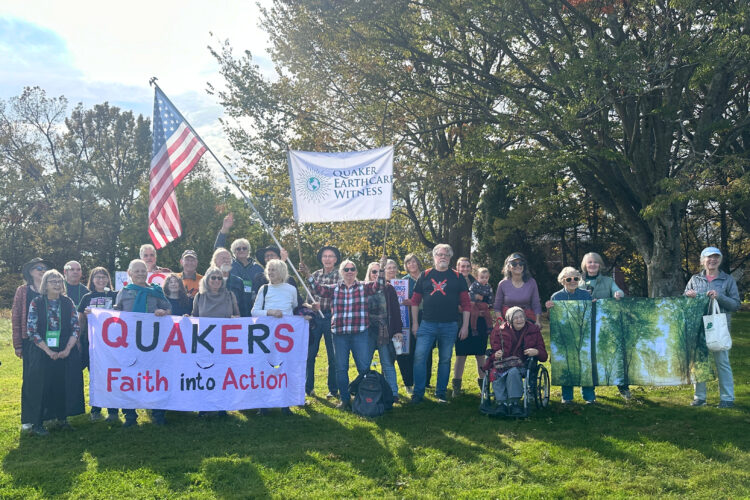Continuing the Conversation

Circles of Discernment and Leadings and Concern Groups give Friends the opportunity to deepen and share
Quaker Institute for the Future (QIF), as a way to facilitate Spirit-led research and action in the manner of Friends using worship sharing and group discernment on topics of critical importance for the future of life on Earth. Some CoDs have met in person, but most have met via conference call and by email. The results of the first CoDs have been published as QIF pamphlets. Now the CoD process has been suggested as a vehicle for QEW to form action groups around specific topics.
The QIF pamphlet series that developed has been oriented toward advancing further study and consultation among Friends on various issues affecting life on Earth. The intent is to make a Quaker contribution to the larger public dialogue on how human communities can live in right relationship with Earth’s commonwealth of life.
The first QIF pamphlet published from a CoD was Fueling our Future: A Dialogue about Technology, Ethics, Public Policy, and Remedial Action. In preparation, Friends gathered for two symposia to hear professionals speak on various aspects of future energy production. Then a small group of five Friends gathered at Pendle Hill for a long weekend of worship-sharing. We developed framing principles that were not to be violated and, with some editing, the task of creating a pamphlet was completed.
The second CoD and QIF pamphlet arose among the editorial team of Quaker Eco-Bulletin. While editing an article on natural capital by David Ciscel, questions arose that were beyond the capacity of that four-page article to address. So, the editorial team clerked by Sandra Lewis, along with David Ciscel, convened a CoD to consider the dichotomy between two world views: one represented by natural capital and the other by deep ecology. We met via conference call over a period of more than two years, even paying for Quaker silence at international phone rates. Each one of those calls put us forward in a way than none of us would have anticipated, leading to a discussion of the commons. We wrote several Quaker Eco-Bulletins as we progressed in our discernment. Then the final piece of the puzzle arose and we knew we were finished. It was time to share our findings. The resulting QIF pamphlet is called, How on Earth Do We Live Now? Natural Capital, Deep Ecology and the Commons.
The two QIF pamphlets published recently on understanding the growth dilemma (It’s the Economy, Friends: Understanding the Growth Dilemma and Beyond the Growth Dilemma: Toward an Ecologically Integrated Economy) were the result of a study group commissioned by Philadelphia Yearly Meeting. Although the group wasn’t called a CoD, the process was based on group discernment.
While QIF-sponsored CoDs have been focused on the preparation of QIF pamphlets as an end point, the CoD process can also be used for other Spirit-led action.
CODS AND QEW
On the QEW discussion listserv, David Millar asked Friends to indicate their interests in topics around which Spirit-led action might be developed. He has suggested that the CoD process be used for Friends to participate in the World We Want 2015 Project, which is a follow-up to Rio + 20. Global discussions are underway on the following topics:
- Environmental sustainability
- Conflict and resilience
- Inequalities
- Education
- Growth and employment
- Food security and nutrition
- Population
- Health
- Governance
- Water
- Energy
- Creativity, arts & crafts
LEADINGS AND CONCERNS ON THE QEW BUSINESS SITE
Another way Friends can have ongoing conversations about Earth issues they care about is to participate in a Leadings and Concerns group on the QEW Business site. If you have signed up for the QEW Business site, you can join these public discussions. Three groups have been created thus far: Energy Interest Group, Gathering for Deeper Relationship with Earth, and Intersection of Economics and Ecology.
Begin by logging in to the QEW Business site (you can access the site by clicking Business site in the upper right corner of any page on our site). You can then join a group, start a discussion, respond to others’ postings. You can easily post articles you’ve found that you want to share with the group and upload documents as needed for others to view and use. Discussions are organized by their titles and responses and subsequent comments appear in a threaded format so they are easy to find, follow, and review.
If you have a leading or a concern you think would make a good discussion group, contact RoyTaylor at wrldpeas[at]mindspring.com.

